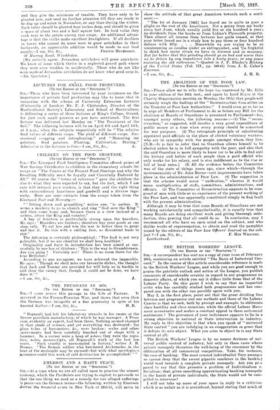THE ABOLITION OF THE POOR LAW. [To THE EDITOR or
THE " SPECTATOR."] Sta,—Please allow me to echo the hope (as expressed by Mr. Ellis in your edition of the 16th inst., and again by Lord Bryce at the Charity Organization meeting on Monday, the 18th) that people will seriously weigh the findings of the " Reconstruction Committee on the Transfer of Poor Law Authorities." I would even go so far as to urge all Members of Parliament to do so before any Bill for the abolition of Boards of Guardians is presented to Parliament—for, amongst ninny others, the following reasons :—(1) The " recon- struction," as suggested, will involve a very great expenditure of public money at a time when every penny should be conserved for war purposes. (2) The retrograde principle of substituting appointed paid officials in the place of elected voluntary workers, who are in sympathy with the people amongst whom they live. [N.B.—It is fair to infer that no Guardian allows himself to be elected unless he is in full sympathy with the poor, and also that the said Guardian is more likely to know (or to be able to find out) the history and habits of such people than a paid official who only works for his salary, and is also indifferent as to the rise or• fall of local rates.] (3) All the evidence before the Committee was of the state of things years ago, since which—through the instrumentality of Mr. John Burns—vast improvements have taken place in the administration of Poor Law. (4) The suggestion is that the scheme would mean " unification," whereas it would mean multiplication of staffs, committees, administrations, and officials. (5) The Committee of Reconstruction appears to be com- posed of men with little or no experience of the present working of the Poor Law, and was apparently constituted simply to find fault with the present administration.
Although it may be true that same Boards of Guardians are not working satisfactorily and sympathetically, it is equally true that many Boards are doing excellent work and giving thorough satis- faction, thus proving that all could do so. In conclusion, may I recommend all who have an open mind on the subject, and who dislike works of supererogation, to obtain and read the pamphlet issued by the editors of the Poor Law Officers' Journal on the sub-


























 Previous page
Previous page